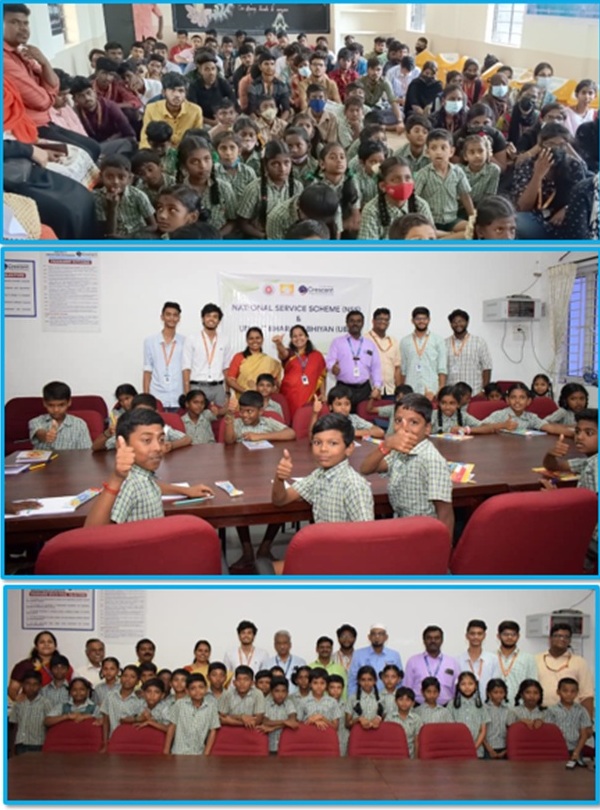Crescent Sustainability Initiatives
CLEAN WATER AND SANITATION (SDG 6)
INTRODUCTION
Water is an essential resource for life, yet its management and conservation often require concerted community efforts. The B.S. Abdur Rahman Crescent Institute of Science and Technology NSS (National Service Scheme) Student Volunteers have significantly promoted conscious water usage on 23.09.2023 at Karanai Puducherry Panchayat, Vandalur Taluk, Chengalpattu District of Tamil Nadu through a hands-on conservation initiative centred around a local pond. Their dedication to this cause enhances the water source’s health and cultivates environmental responsibility within the wider community.
FOCUS ON POND CONSERVATION
The B.S. Abdur Rahman Crescent Institute of Science and Technology NSS Student Volunteers have zeroed in on a local pond, recognising its critical role in the ecosystem and community. Their initiative encompasses several vital activities aimed at rejuvenating the pond and fostering a culture of water conservation.
- Clean-Up and Maintenance
- The volunteers are actively engaged in clearing debris from the pond area. By removing litter and waste, they help maintain the water’s quality and contribute to the overall health of the surrounding environment.
- This hands-on approach cleans the area and showcases the importance of protecting natural habitats from pollution. The volunteers’ commitment is evident as they carry bags filled with collected garbage, representing their dedication to environmental stewardship.
- Enhancing Community Awareness
- The B.S. Abdur Rahman Crescent Institute of Science and Technology NSS Student Volunteers are focused on physical clean-up and educating the community about the significance of conscious water usage. By sharing their experiences and knowledge, they encourage others to recognise the importance of preserving water resources.
- Through workshops, demonstrations, and community outreach, the volunteers promote practices that lead to responsible water consumption, highlighting simple changes that can make a significant difference.
IMPACT ON THE COMMUNITY
The efforts of the NSS Student Volunteers extend beyond the immediate physical improvements to the pond. Their work fosters a broader sense of environmental consciousness and responsibility within the community:
- Inspiring Collective Action: By actively participating in clean-up efforts, the volunteers inspire others to take action, creating a ripple effect that encourages community members to engage in similar initiatives.
- Educating the Next Generation: Through their efforts, these students serve as role models for younger generations, instilling the values of environmental care and the importance of sustainable practices from an early age.
- Fostering Community Pride: The visible improvements in the pond and surrounding area promote a sense of pride among community members, reinforcing that collective efforts can lead to tangible environmental benefits.
The B.S. Abdur Rahman Crescent Institute of Science and Technology, NSS Student Volunteers, have taken commendable steps to promote conscious water usage and environmental stewardship in their community through their focused efforts on pond conservation. Their activities contribute to the health and sustainability of a vital water source and empower the community through education and engagement. By fostering a culture of responsibility towards water conservation, they set a powerful example of how proactive initiatives can lead to lasting change in environmental attitudes and practices.

Figure VI (5.7) – 1: NSS Student Volunteers – clean the pond and its surrounding area
THREE-DAY PROGRAM FOCUSED ON THE CONSCIOUS WATER CONSERVATION PROGRAM FOR PRIMARY SCHOOL STUDENTS IN AN ADOPTED VILLAGE – DATED: 23.09.2022
The B.S. Abdur Rahman Crescent Institute of Science and Technology is dedicated to promoting conscious water usage, a critical aspect of sustainable living beyond the campus’s confines. Recently, the National Service Scheme (N.S.S.) and Urban Body Association (U.B.A.) organised a three-day program focused on the Conscious Water Conservation Program for primary school students in an adopted village. This initiative engaged over 30 schoolchildren, highlighting the value of education in fostering a culture of water conservation within the community.
The Conscious Water Conservation Program was designed to educate young minds and instil a sense of responsibility towards water conservation. N.S.S. and U.B.A. volunteers played a crucial role in delivering the content, teaching children about the significance of water as a vital resource for life by emphasising the various uses of water, including drinking, sanitation, and agriculture. The program aimed to create a comprehensive understanding of why water conservation is vital in today’s world. This foundational knowledge is essential for encouraging children to think critically about their water usage habits in the future.
Interactive activities enhanced the learning experience, making it engaging for the young participants. Through discussions and hands-on activities, children explored practical methods of conserving water, such as minimizing waste during daily routines and understanding the importance of rainwater harvesting. These interactive components made learning enjoyable and provided students with tangible actions they could incorporate into their lives to contribute to water conservation efforts.
The program extended beyond just educating children; it also aimed to empower them to become advocates for water conservation in their families and communities. The institute aims to create future leaders who prioritise responsible water usage by instilling a sense of environmental stewardship. When children bring these lessons home, they can influence their families’ habits, amplifying the program’s impact throughout the community.
Collaboration with local community leaders and parents played a vital role in the success of this initiative. By promoting the importance of water conservation through community networks, the institute fosters a collective responsibility towards sustainable water management. Such partnerships pave the way for broader outreach and the potential to enact community-wide changes in behaviour regarding water usage.
Looking ahead, the B.S. Abdur Rahman Crescent Institute of Science and Technology is committed to sustaining these efforts to promote conscious water usage within the community. By expanding initiatives like the water importance program, the institute aims to reinforce the knowledge gained and encourage continuous engagement in responsible water management. As the community becomes more aware and proactive about water conservation, it will contribute to a healthier environment and a more sustainable future for all.

Figure VI (5.7) – 2: Students actively participate in the three-day Conscious Water Conservation Program
Water Management and Reuse Policy
Issue: 04; Revised on 2023
| Policy Created on | July 2009 |
| 1st Revision amended on | IQAC Meeting held on 27th October 2017 |
| 2nd Revision amended on | IQAC Meeting held on 31st March 2021 |
| 3rd Revision amended on | IQAC Meeting held on 16th June 2023 |
6.1 STATEMENT OF POLICY
The B.S. Abdur Rahman Crescent Institute of Science and Technology is committed to achieving the following objectives in alignment with Sustainable Development Goal 6 (SDG 6) – Clean Water and Sanitation:
- a) Ensure universal and equitable access to safe and affordable drinking water for all stakeholders.
- b) Provide adequate and equitable sanitation and hygiene for all, with special attention to the needs of women, girls, and vulnerable groups.
- c) Improve water quality by reducing pollution, eliminating dumping, and minimizing the release of hazardous chemicals and materials.
- d) Halve the proportion of untreated wastewater and substantially increase recycling and safe reuse globally.
- e) Substantially increase water-use efficiency across all sectors and ensure sustainable withdrawals and freshwater supply to address water scarcity.
- f) Implement integrated water resources management at all levels, including transboundary cooperation as appropriate.
- g) Protect and restore water-related ecosystems, including mountains, forests, wetlands, rivers, aquifers, and lakes.
- h) Expand international cooperation and capacity-building support to developing countries in water- and sanitation-related activities and programs.
- i) Support and strengthen the participation of local communities in improving water and sanitation management.
6.2 REASON FOR THIS POLICY
The policy aims to provide all stakeholders with adequate water supply, sanitation, and hygiene. It emphasises maximising the collection and treatment of sewage generated and the reuse of treated wastewater sustainably, thereby reducing dependency on freshwater resources. The policy promotes treating wastewater as an economic resource.
6.3 RESPONSIBILITIES
6.3.1 Policy Principles
- a) The campus shall provide adequate water supply and maximize water reuse by adhering to the following principles:
- Equitable access to safe and affordable drinking water for all stakeholders.
- Access to adequate sanitation and hygiene, ending open defecation, with special attention to vulnerable groups.
- Calculation of water usage per person (students, staff, and faculty) annually.
- Improving water quality by reducing pollution and increasing recycling and safe reuse.
- Utilization of recycled/treated wastewater for beneficial purposes, such as irrigation and toilet flushing.
- Implementation of integrated water resources management at all levels.
- Protection and restoration of water-related ecosystems on campus.
- Expansion of rainwater harvesting initiatives.
- Collaboration with government, NGOs, and industries in water-related activities.
- Support for student and staff participation in water management.
6.4.1 Water Reuse Policy Objectives
- Establish a comprehensive policy to maximize water reuse across the university.
- Ensure that all new buildings adhere to water-conscious building standards that facilitate water reuse.
- Implement systems for tracking and measuring water consumption and reuse.
6.4.2 Water Reuse
- Water Reuse Policy: maximise water reuse across the university.
- Water Reuse Measurement: Measure water reuse across the university.
6.5 DISSEMINATION OF POLICY
- a) Display signage promoting water use efficiency across the campus.
- b) Conduct awareness programs at regular intervals to increase water-use efficiency.
- c) Post the policy on the Institute’s website and update it as necessary.
6.6 ENFORCEMENT OF POLICY
- a) The Director (Planning & Development) and Deputy Director monitor compliance and address breaches.
- b) Awareness of the policy among students, staff, and visitors is essential.
- c) Breaches may lead to disciplinary action as per the Institute’s code of conduct.
REGISTRAR


